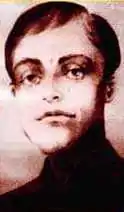Madan Mohan Tarkalankar
Madan Mohan Tarkalankar (Bengali: মদন মোহন তর্কালঙ্কার) (3 January 1817 – 9 March 1858) was a Bengali poet and Sanskrit scholar. He also developed Bengali text-books for children. Ishwar Chandra Vidyasagar, Akshay Kumar Datta and Tarkalankar were the first "to envisage texts that would build the character of the new generation without sacrificing literary sensitivity. Virtually, the entire mental make-up of the late nineteenth century Bengali society was structured through these text books."[3] He, along with his friend Ishwar Chandra Vidyasagar, set up the Sanskrit Press and Depository, a print shop and a bookstore.[4]
Madan Mohan Tarkalankar | |
|---|---|
 | |
| Born | 3 January 1817 |
| Died | 9 March 1858 (aged 41) |
| Occupation | Poet, Sanskrit scholar |
Early life
The son of Ramdhan Chattopadhyay of Bilwagram in Nadia district, his original name was Kalikinkar Chattopadhyay. He was a classmate of Ishwar Chandra Vidyasagar at Sanskrit College, Kolkata, and later studied at Hindu College. He was conferred the title of Kabyaratnakar by his teachers and professors because of his exceptional poetic talents. His friends conferred the title of Tarkalankar.[2]
While still a student he composed two volumes of poetry, namely Rasatarangini and Vidyaratna.[2]
Achievements
He taught at Fort William College and Krishnanagar College, before joining Sanskrit College, as professor of literature in 1846. He went to Murshidabad as judge-pandit in 1855 and was promoted to deputy magistrate in 1855. He established a printing press in Kolkata and published many old Bengali and Sanskrit books.[2] Basabdatta is one of his important works. While at Fort William College, he taught his colleague, William Carey(a Baptist missionary who later founded Serampore College), the Sanskrit language which helped William Carey in translating The Bible into Sanskrit language and The Ramayana into the English language.
Bethune's school
In the 19th century, the educated elite or middle class did not send their daughters to school. John Elliot Drinkwater Bethune first achieved success in this respect with the support of Dakshinaranjan Mukherjee, Ramgopal Ghosh and Madan Mohan Tarkalankar. He also wrote the first modern Bengali primer, Sishu Siksha(completed in three parts), for the school, and his two daughters (Kundamala and Bhubanmala) were amongst the first students of the school.[5] He taught in the school without any remuneration.[2]
References
- Kabibar Madanmohan Tarkalankarer Jibancharit o Tat-grantha Somalochona (Life of the Late Madana Mohana Tarkalankara) (Bengali), The New Indian Press, Calcutta, 1870
- Sengupta, Subodh Chandra and Bose, Anjali (editors), 1976/1998, Sansad Bangali Charitabhidhan (Biographical dictionary) Vol I, (in Bengali), p391, ISBN 81-85626-65-0
- Majumdar, Swapan, Literature and Literary Life in Old Calcutta, in Calcutta, the Living City, Vol I, edited by Sukanta Chaudhuri, pp112-113, Oxford University Press, ISBN 0-19-563696-1.
- Ishwar Chandra Vidyasagar#Teaching career
- Acharya, Paramesh, Education in Old Calcutta, in Calcutta, the Living City, Vol I, edited by Sukanta Chaudhuri, p87, Oxford University Press, ISBN 0-19-563696-1.